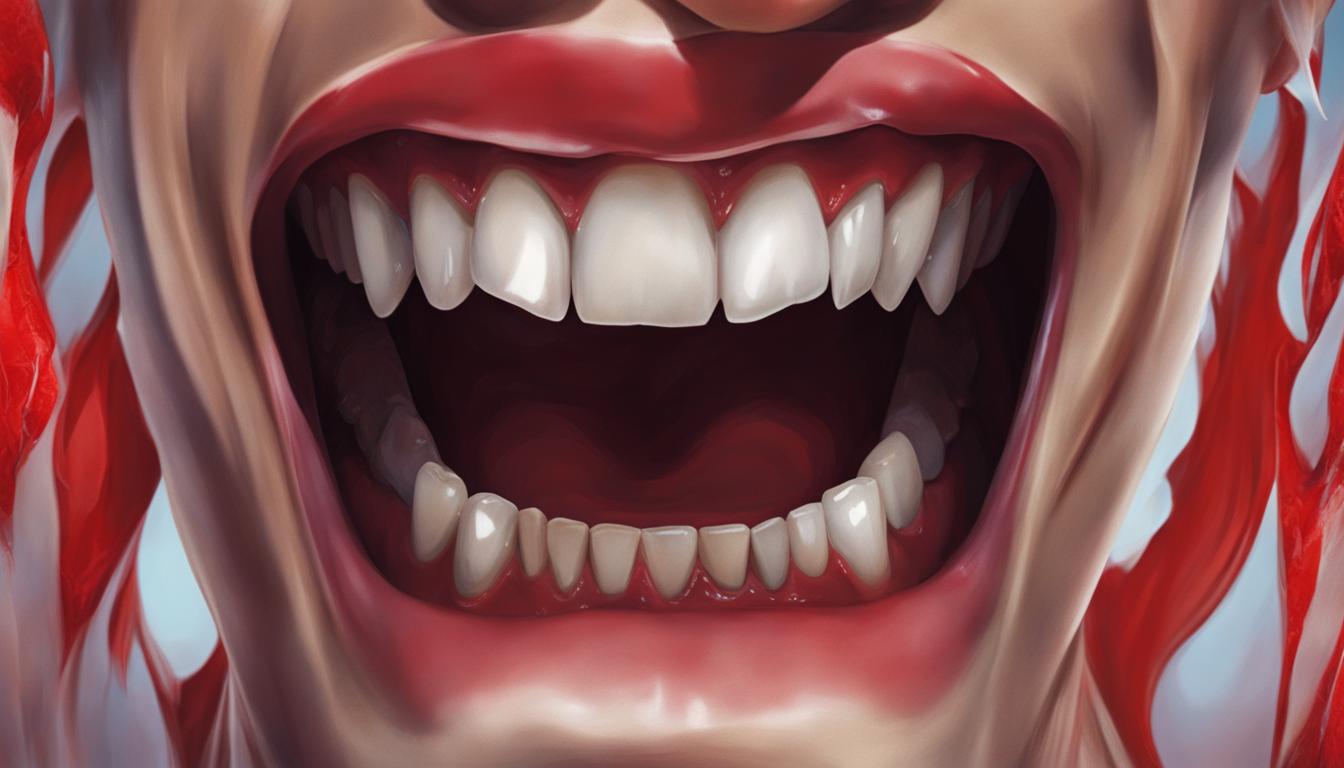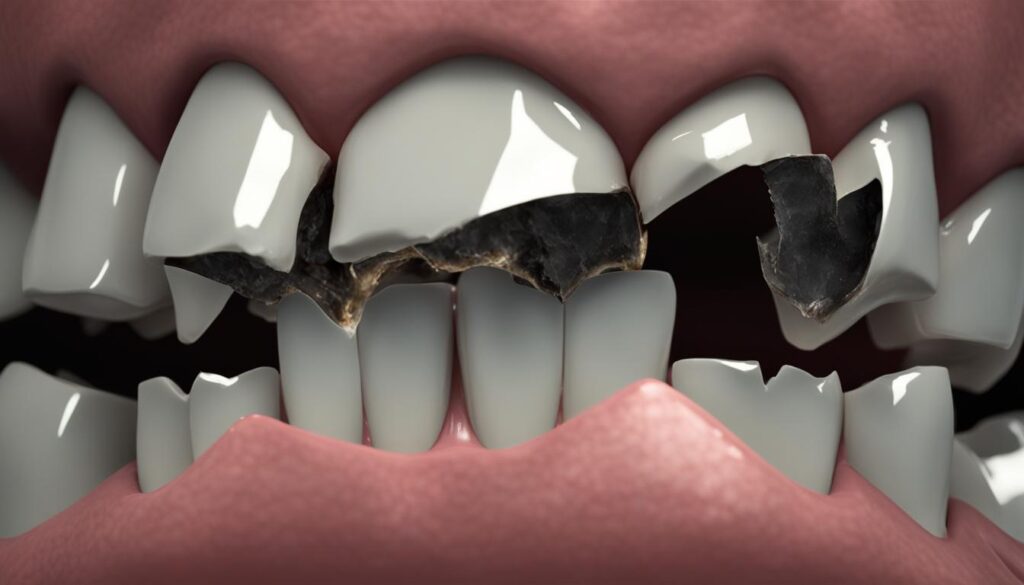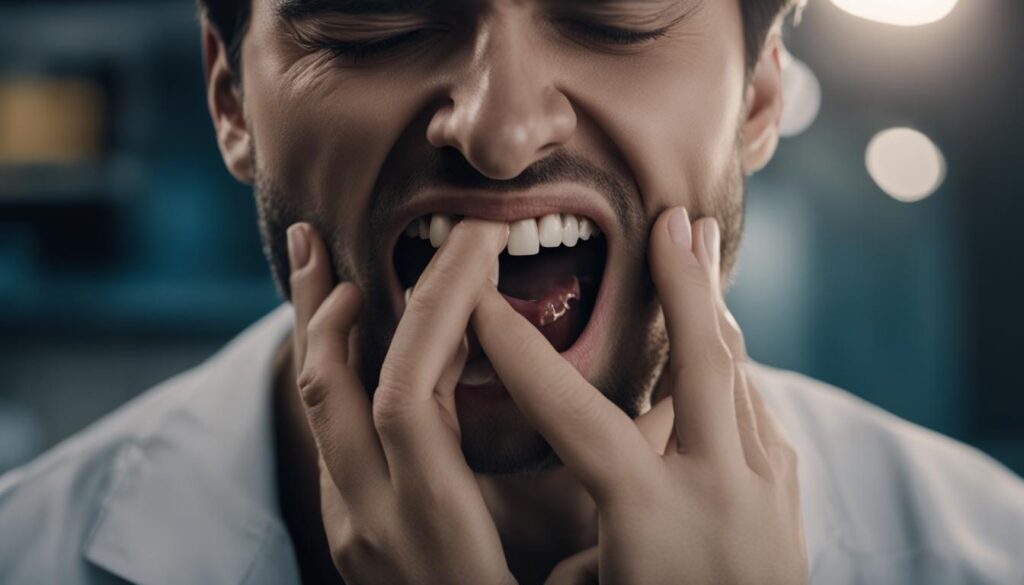Unraveling the Mystery: Why Are My Teeth Sensitive All of a Sudden?
Have you ever experienced sudden tooth sensitivity and wondered why it happened? You’re not alone. Many people find themselves dealing with this discomfort unexpectedly. But fear not, because in this article, I will delve into the reasons behind sensitive teeth and provide you with strategies to alleviate the pain and discomfort.
Key Takeaways:
- Sudden tooth sensitivity is a common issue with various underlying causes
- Possible reasons include decay, exposed tooth roots, gum disease, worn enamel or dentin, cracked teeth, and prior dental procedures
- Relief can be found through desensitizing toothpaste, good oral hygiene, soft-bristled toothbrushes, diet adjustments, mouthguards, and professional dental consultation
- Poor oral hygiene can lead to dental cavities and gum disease, exacerbating tooth sensitivity
- Recognizing the signs of dental injuries is crucial to prevent further complications
Exploring the Root Causes of Tooth Sensitivity
When it comes to sudden tooth sensitivity, there are several underlying causes that can contribute to this uncomfortable condition. Understanding these causes is crucial in finding the right solution and alleviating the discomfort. Let’s take a closer look at some of the primary factors behind tooth sensitivity:
- Decay and Cavities: Tooth decay and cavities can expose the sensitive inner layers of the teeth, leading to heightened sensitivity.
- Exposed Tooth Roots: Receding gums or periodontal disease can cause the tooth roots to become exposed, making them susceptible to sensitivity.
- Gum Disease: Inflamed or diseased gums can contribute to tooth sensitivity by exposing the underlying structures of the teeth.
- Worn Enamel or Dentin: Over time, the protective enamel layer of the teeth can wear down, exposing the sensitive dentin beneath.
- Cracked Teeth: Fractured or cracked teeth can expose the nerves, resulting in increased sensitivity.
- Prior Dental Procedures: Certain dental treatments, such as fillings, crowns, or teeth whitening, can cause temporary tooth sensitivity.
By identifying the root causes of tooth sensitivity, individuals can work with their dentist to develop a personalized treatment plan to address the issue. It is important to consult a dental professional for an accurate diagnosis and appropriate treatment options.
Now let’s take a closer look at some strategies to help reduce tooth sensitivity and alleviate the discomfort in the next section.
Finding Relief: Strategies to Reduce Tooth Sensitivity
Dealing with sudden tooth sensitivity can be quite discomforting. Fortunately, there are several remedies and treatments available to help alleviate the pain and reduce the sensitivity of your teeth. By implementing these strategies, you can regain your oral comfort and enjoy your favorite foods without worry.
1. Desensitizing Toothpaste
One of the first steps in treating tooth sensitivity is to switch to a desensitizing toothpaste. These toothpastes contain ingredients such as potassium nitrate or strontium chloride that help to block the pain signals from reaching the nerves in your teeth. With regular use, desensitizing toothpaste can provide significant relief from sensitive teeth. It is important to note that the effects may take some time to become noticeable, so patience is key.
2. Good Oral Hygiene
Maintaining good oral hygiene practices is crucial in managing tooth sensitivity. Proper brushing with a soft-bristled toothbrush and flossing daily can help remove plaque and prevent gum disease, which can contribute to tooth sensitivity. It is recommended to brush gently using circular motions and to avoid brushing too aggressively as this can further wear down the enamel and aggravate sensitivity.
3. Healthy Dietary Habits
Your diet plays a significant role in tooth sensitivity. Limiting your consumption of acidic or sugary foods and beverages can help protect the enamel and reduce tooth sensitivity. Acidic foods and drinks can erode the enamel, exposing the sensitive dentin layer beneath. Opting for a balanced diet rich in calcium, vitamin D, and phosphorus can promote strong teeth and help reduce sensitivity.
If your tooth sensitivity persists or worsens despite trying home remedies, it is important to consult a dentist. They can identify the underlying cause of your sensitivity and recommend appropriate treatments. In some cases, treatments such as fluoride application, dental bonding, or dental restorations may be necessary to provide long-term relief from tooth sensitivity.
By incorporating these strategies into your oral care routine and seeking professional advice when needed, you can effectively reduce tooth sensitivity and regain your oral comfort.
Oral Health and Dental Problems
When it comes to oral health, poor oral hygiene can often be a culprit for various dental problems. Neglecting to maintain regular brushing and flossing habits can lead to the development of dental cavities and gum disease. These issues can cause discomfort, pain, and even tooth loss if left untreated.
Dental cavities, also known as dental caries, are areas of decay that form on the surface of the teeth. They are often caused by the buildup of plaque, a sticky film of bacteria that forms on our teeth. When plaque interacts with certain foods, it produces acids that attack the tooth enamel, leading to cavities if not removed through proper oral hygiene practices.
Gum disease, or periodontal disease, is an infection of the tissues surrounding the teeth. It is primarily caused by the buildup of plaque and tartar along the gumline. If not addressed, gum disease can progress and result in inflammation, gum recession, tooth loss, and even impact overall health.
To maintain optimal oral health, it is essential to prioritize good oral hygiene habits. This includes brushing your teeth at least twice a day using fluoride toothpaste, flossing daily, and visiting your dentist for regular check-ups and cleanings. By doing so, you can prevent oral health problems and ensure a healthy and confident smile.
The Importance of Good Oral Hygiene
- Brush your teeth at least twice a day using fluoride toothpaste.
- Floss daily to remove plaque and food particles from between your teeth.
- Limit your consumption of sugary and acidic foods and beverages.
- Avoid tobacco products, as they can contribute to gum disease and other oral health problems.
- Visit your dentist regularly for professional cleanings and check-ups.
“A healthy smile starts with good oral hygiene habits. By maintaining proper brushing, flossing, and regular dental visits, you can prevent many oral health problems and ensure a confident smile.”
By taking care of your oral health and practicing good oral hygiene, you can minimize the risk of dental cavities, gum disease, and other oral health problems. Remember, prevention is always better than cure, so make sure to prioritize your oral hygiene routine for a healthy and beautiful smile.
| Common Oral Health Problems | Symptoms |
|---|---|
| Dental Cavities | Tooth sensitivity, toothache, visible holes or pits in the teeth |
| Gum Disease | Bleeding or swollen gums, persistent bad breath, receding gums |
| Dental Abscess | Tooth pain, swelling and redness of the gums, fever |
| Oral Thrush | Creamy white lesions on the tongue, inner cheeks, or roof of the mouth |
| Tooth Erosion | Loss of tooth enamel, tooth sensitivity, yellowing of teeth |
Manifestations of Dental and Oral Difficulties
When it comes to dental and oral problems, there are several symptoms that may indicate an underlying issue. These manifestations can vary in severity and should be addressed promptly to prevent further complications. Some common symptoms of dental and oral health problems include:
- Bleeding or inflamed gums
- Ulcers or sores in the mouth
- Chronic bad breath
- Sensitivity to hot and cold temperatures
- Loose teeth
- Declining gums
- Pain or toothache
- Cracked or broken teeth
- Pain with biting or chewing
- Frequent dry mouth
- Clicking of the jaw
- Inflammation of the cheek and face
These symptoms can be indicative of different dental and oral problems such as cavities, gingivitis, periodontitis, cracked teeth, sensitive teeth, and even oral cancer. It’s important to pay attention to any changes or discomfort in your oral health and seek professional dental care for proper diagnosis and treatment.
| Condition | Symptoms |
|---|---|
| Cavities | Toothache, sensitivity, visible holes or pits in teeth |
| Gingivitis | Bleeding gums, swollen or red gums, bad breath |
| Periodontitis | Gum recession, loose teeth, deep pockets between teeth and gums |
| Cracked Teeth | Tooth sensitivity, pain when biting or chewing, visible cracks on teeth |
| Sensitive Teeth | Pain or discomfort when consuming hot, cold, or sweet foods and drinks |
| Oral Cancer | Ulcers or sores that don’t heal, persistent pain, difficulty swallowing |
If you experience any of these symptoms or notice any changes in your oral health, it is recommended to consult a dentist for a thorough examination. Early detection and treatment can help prevent further complications and maintain a healthy smile.
Dental and Oral Diseases
When it comes to dental and oral health, various diseases can cause discomfort and pain. Understanding these conditions is key to maintaining good oral hygiene and seeking prompt treatment. Some of the most common dental and oral diseases include cavities, gingivitis, periodontitis, cracked teeth, sensitive teeth, and oral cancer.
Cavities, also known as dental caries, are a result of tooth decay caused by bacteria. Without proper oral hygiene and regular dental check-ups, cavities can lead to toothache, infections, and even tooth loss. Gingivitis is a common form of gum disease characterized by red, swollen, and bleeding gums. If left untreated, gingivitis can progress to periodontitis, a more severe condition that can cause gum recession and tooth loss.
Cracked teeth, whether from trauma or biting on hard objects, can be painful and susceptible to infection. Sensitive teeth can be a result of worn enamel, exposed tooth roots, or receding gums, leading to discomfort when consuming hot or cold foods and drinks. Finally, oral cancer is a serious condition that can affect the lips, tongue, cheeks, throat, and other parts of the mouth. Early detection and treatment are crucial for successful outcomes.
Table: Overview of Common Dental and Oral Diseases
| Disease | Description | Symptoms |
|---|---|---|
| Cavities | Result from tooth decay caused by bacteria | Toothache, tooth sensitivity, visible holes in teeth |
| Gingivitis | Gum inflammation caused by plaque buildup | Red, swollen, and bleeding gums |
| Periodontitis | Advanced gum disease affecting the supporting structures of the teeth | Gum recession, tooth mobility, pus formation |
| Cracked Teeth | Fractures in the tooth structure | Tooth sensitivity, pain when biting, visible cracks |
| Sensitive Teeth | Tooth sensitivity due to exposed dentin or receding gums | Pain or discomfort when consuming hot, cold, or sweet foods |
| Oral Cancer | Malignant growth in the mouth or throat | Lesions or sores that do not heal, difficulty swallowing, persistent pain |
Regular dental visits, proper oral hygiene practices, and a healthy lifestyle can help prevent and manage these dental and oral diseases. If you experience any symptoms or suspect a dental problem, it is important to consult a dentist for a proper diagnosis and appropriate treatment.
Differentiating Between Dental Injuries
When it comes to dental injuries, there are various types that can occur, each with its own distinct characteristics. Understanding the differences between these injuries is important for proper diagnosis and treatment. Let’s explore the various forms of dental injuries:
1. Broken Teeth
Broken teeth are a common dental injury that can result from accidents, trauma, or biting down on something hard. They can range from minor chips to severe fractures. Broken teeth can cause pain, sensitivity, and difficulty biting or chewing.
2. Cracked Teeth
Cracked teeth occur when there is a visible line or fracture on the tooth surface. They may not always be painful but can cause discomfort when chewing or when exposed to hot or cold temperatures. Cracked teeth can vary in severity and may require different treatments depending on the extent of the damage.
3. Fractured Teeth
Fractured teeth go beyond simple cracks and involve damage to the underlying structure of the tooth, such as the dentin or pulp. These injuries can be painful and may require immediate dental attention to prevent further complications.
4. Crazed Lines
Crazed lines are fine cracks that affect the enamel of a tooth. They are often caused by excessive force or pressure on the tooth. Crazed lines are usually asymptomatic but can be an early warning sign of more significant dental issues.
5. Chipped Teeth
Chipped teeth occur when a small piece of the tooth enamel breaks off. This can happen due to accidents, biting down on hard objects, or tooth decay. While chipped teeth may not always be painful, they can affect the appearance of your smile and may require dental treatment.
6. Cracked Crowns
A dental crown can crack if it is subjected to excessive force, such as biting down on hard foods or grinding teeth. Cracked crowns can cause sensitivity, discomfort, and even lead to further damage if left untreated.
7. Cracked Fillings
Fillings can crack or become damaged over time due to wear and tear, decay, or pressure from biting or chewing. Cracked fillings can expose the underlying tooth to bacteria and may require replacement to prevent further complications.
Understanding the different types of dental injuries can help you identify potential issues and seek prompt dental care. If you experience any symptoms or suspect a dental injury, it is important to consult with your dentist for proper evaluation and treatment.
Recognizing the Signs of Dental Injury
If you experience tooth sensitivity or pain, notice rough or sharp edges on your teeth, or observe any visible signs such as discoloration, obvious cracks, or chips, these could be indicators of dental injury. Paying attention to these signs is crucial in addressing potential problems and seeking appropriate dental treatment.
Tooth sensitivity is a common symptom of dental injury. If you feel a sharp or shooting pain when consuming hot or cold foods or beverages, or when breathing in cold air, it could be a sign that your tooth enamel is compromised or that there is an underlying dental issue. It’s essential to consult a dentist to determine the cause and receive the appropriate treatment.
Another telltale sign of dental injury is the presence of rough or sharp edges on your teeth. This can occur due to teeth grinding, trauma, or wear and tear over time. These rough edges can be uncomfortable and may make oral hygiene practices more challenging. Seeking professional dental care can help smooth out these rough edges and prevent further damage.
“Paying attention to the signs of dental injury is crucial in addressing potential problems and seeking appropriate dental treatment.”
In addition to tooth sensitivity and rough edges, visible signs such as discoloration, obvious cracks, or chips should not be ignored. These visual cues can indicate structural damage to the teeth, which may require immediate dental attention. Ignoring these signs can lead to further complications and potentially more extensive dental procedures down the line.
By recognizing the signs of dental injury, you can take the necessary steps to address the issue promptly. Seeking professional dental care, practicing good oral hygiene, and making lifestyle modifications as recommended by your dentist can help prevent further damage and ensure the long-term health of your teeth and gums.
The Dangers of Ignored Dental Injuries
Ignoring dental injuries can have serious consequences for your oral health. Broken teeth that are left untreated can lead to further complications, including infections, decay, and gum disease. When a tooth breaks in the gums, it can cause pain and discomfort, as well as increase the risk of infection. Additionally, teeth that have broken off at the gum line require immediate attention to prevent infection and preserve the surrounding teeth.
One potential consequence of untreated dental injuries is the development of black broken teeth. When a tooth is damaged and not repaired, it can become discolored, appearing dark or black in color. This can be aesthetically displeasing and impact your self-confidence. It’s important to address dental injuries promptly to avoid such complications and maintain a healthy, attractive smile.
Importance of Seeking Dental Care
Seeking prompt dental care after a dental injury is crucial to prevent further damage and complications. Dentists have the expertise and tools to assess the extent of the injury and provide appropriate treatment. Depending on the severity of the injury, treatment options may include dental bonding, fillings, dental crowns, or extraction followed by tooth replacement options like dental implants or bridges.
Regular dental check-ups are also essential for detecting and addressing dental injuries early on. Dentists can identify signs of damage, such as fractures, cracks, or chips, and recommend appropriate treatment to prevent the injury from worsening.
In conclusion, ignoring dental injuries can lead to significant risks and complications. Prompt treatment and regular dental care are essential for preserving oral health and preventing further damage. If you have experienced a dental injury, it is crucial to consult with a dentist as soon as possible to address the issue and ensure the best possible outcome.
Special Cases: Wisdom Teeth Woes
Wisdom teeth, also known as third molars, can often cause problems and discomfort due to their late eruption and limited space in the mouth. When wisdom teeth become impacted or fail to fully emerge from the gum line, they can lead to various issues. Two common problems associated with wisdom teeth are broken wisdom teeth and wisdom teeth that are broken below the gum line.
Broken wisdom teeth can occur when the tooth is weakened or damaged, resulting in a fracture or break. This can happen due to decay, trauma, or excessive pressure from neighboring teeth. Broken wisdom teeth can cause pain, inflammation, and even infections if left untreated. In some cases, the broken pieces of the tooth may need to be extracted.
Wisdom teeth that are broken below the gum line pose a unique challenge. Since they are not fully visible, it can be difficult to detect and address the issue. Broken wisdom teeth below the gum line can lead to decay, gum infections, and cyst formation. Treatment typically involves extracting the affected tooth and addressing any underlying infections or complications.
| Common Problems with Wisdom Teeth | Symptoms | Treatments |
|---|---|---|
| Broken Wisdom Teeth | Pain, inflammation, sensitivity, visible damage | Extraction, dental restoration |
| Wisdom Teeth Broken Below the Gum Line | Infection, decay, cyst formation | Extraction, treatment of infections or complications |
If you are experiencing discomfort or suspect any issues with your wisdom teeth, it is essential to consult with a dentist. They can evaluate your oral health, take x-rays if necessary, and determine the best course of action. Early intervention can help prevent complications and alleviate any wisdom tooth-related woes.
Cosmetic Concerns: Dealing with Visible Injuries
When it comes to dental injuries, visible damage can have a significant impact on our self-confidence. From broken or cracked front teeth to damaged dental crowns and fillings, these visible concerns can affect our smile and overall appearance. However, addressing these issues is not just about cosmetic enhancements; it is also crucial for maintaining good oral health.
Whether it’s a broken front tooth or a cracked filling, it’s important to seek professional dental care to address visible injuries. Dentists have various treatment options to restore and repair damaged teeth, such as dental bonding, veneers, or even dental implants in severe cases. These procedures can not only enhance your smile but also protect your teeth from further damage.
Furthermore, seeking prompt treatment for visible dental injuries can help prevent complications and additional oral health issues. Cracked fillings, for example, can allow bacteria to enter the tooth structure, leading to decay or infection. By addressing these injuries early on, you can maintain a healthy and beautiful smile for years to come.
Remember, visible dental injuries should not be ignored or taken lightly. Consult with your dentist to explore the best treatment options for your specific situation. They will provide personalized care to address your concerns and restore your smile, boosting both your confidence and oral health.
Common Visible Dental Injuries
| Injury | Description |
|---|---|
| Broken Front Teeth | Front teeth that have been chipped or fractured due to trauma or accidents. |
| Cracked Front Teeth | Teeth with small cracks or fractures, which can cause pain or sensitivity. |
| Broken Dental Crowns | Dental crowns that have become damaged or dislodged, exposing the natural tooth underneath. |
| Cracked Fillings | Fillings that have cracked or broken, potentially causing tooth pain or decay. |
Conclusion
In conclusion, tooth sensitivity and dental injuries can be a cause for concern, but there are effective ways to find relief and address these issues. By understanding the underlying causes of tooth sensitivity and recognizing the signs of dental injuries, we can take proactive steps to protect our oral health and maintain a confident smile.
To alleviate tooth sensitivity, it is important to use desensitizing toothpaste and maintain good oral hygiene practices. Choosing a soft-bristled toothbrush and limiting acidic or sugary foods can also help reduce sensitivity. Additionally, wearing a mouthguard at night, cutting back on alcohol and tobacco use, and considering fluoride treatment can provide further relief.
When it comes to dental injuries, it is crucial not to ignore them. Untreated dental injuries can lead to complications such as infections, decay, and gum disease. Whether it’s a broken tooth, a cracked filling, or a chipped crown, seeking prompt dental care is essential to prevent further damage and maintain oral health.
By taking the necessary steps to address tooth sensitivity and dental injuries, we can ensure a healthy and confident smile for years to come.
FAQ
Why are my teeth suddenly sensitive?
Tooth sensitivity can occur suddenly due to various factors, including decay, exposed tooth roots, gum disease, worn enamel or dentin, cracked teeth, and prior dental procedures.
How can I reduce tooth sensitivity?
To reduce tooth sensitivity, you can use desensitizing toothpaste, maintain good oral hygiene, choose a soft-bristled toothbrush, limit acidic or sugary foods, use a mouthguard at night, cut back on alcohol and tobacco use, opt for fluoride treatment, and consult a dentist.
What problems can arise from poor oral hygiene?
Inadequate oral hygiene can lead to dental cavities and gum disease. Not regularly brushing and flossing can contribute to these problems.
What are the symptoms of dental and oral health problems?
Symptoms may include bleeding or inflamed gums, ulcers or sores in the mouth, chronic bad breath, sensitivity to hot and cold temperatures, loose teeth, declining gums, pain or toothache, cracked or broken teeth, pain with biting or chewing, frequent dry mouth, clicking of the jaw, and inflammation of the cheek and face.
What dental and oral diseases can cause tooth pain?
Cavities, gingivitis, periodontitis, cracked teeth, sensitive teeth, and oral cancer can all cause tooth pain and discomfort.
What types of dental injuries can occur?
Dental injuries can take different forms, including broken teeth, cracked teeth, fractured teeth, crazed lines, chipped teeth, cracked crowns, and cracked fillings.
What are the signs of dental injury?
Signs of dental injury can include tooth sensitivity or pain, rough or sharp edges, and visible signs such as discoloration or obvious cracks or chips.
Why is it important to address dental injuries?
Ignoring dental injuries can lead to further complications, such as infections, decay, and gum disease. Broken teeth in the gums, teeth breaking off at the gum line, and black broken teeth are all potential risks of untreated dental injuries.
What challenges can wisdom teeth present?
Wisdom teeth can lead to decay, infections, and pain, especially if they are broken or below the gum line.
How do visible dental injuries impact self-confidence?
Visible dental injuries, such as broken or cracked front teeth, broken dental crowns, and cracked fillings, can impact our self-confidence. It is important to address these issues for both oral health and cosmetic reasons.
How can I find relief for tooth sensitivity and dental injuries?
By understanding the causes and recognizing the signs, you can take proactive steps to protect your oral health and maintain a confident smile. Consult a dentist for personalized advice and treatment options.








